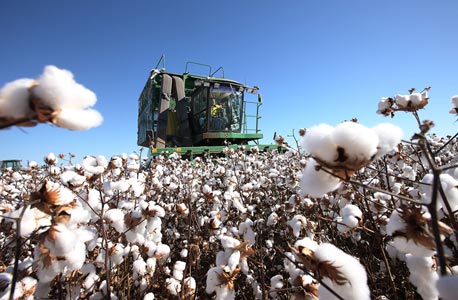Evogene Signs Brazilian Partnership to Develop Pest-Resistant Cotton
Israel-based Evogene will identify pest-resistant genes in cotton, and Brazilian crop research Instituto Mato-Grossense do Algodão will test their effectiveness
13:1218.07.18
Genetic crops design company Evogene Ltd. is partnering with Instituto Matogrossense do Algodão (IMAmt), a crop research and diffusion company owned by the Mato Grosso Cotton Growers Association, the largest cotton growers association in Brazil.
For daily updates, subscribe to our newsletter by clicking here.
On Tuesday, the two announced a research and validation agreement in the field of insect resistance traits in cotton, primarily focused on two pests that have a great impact on the Brazilian cotton industry: the Cotton Boll Weevil, a beetle that lays its eggs in cotton buds, and the Fall Armyworm. A 2017 publication by the International Cotton Advisory Committee, a Washington, D.C.-headquartered association of 29 governments of cotton-producing nations, estimated the annual damages caused by the Boll Weevil at $468 million just in Brazil.
 Cotton. Photo: Bloomberg
Cotton. Photo: Bloomberg
Israel-based, Tel Aviv-listed Evogene uses computational predictive biology to develop novel crop strains and pesticides. The company will screen its existing insecticidal gene database to select genes predicted to be effective against both pests, and IMAmt will validate them in lab tests. Evogene will also receive research and development funding for the initial discovery phase, the company stated.
Related stories:
- DuPont-Pioneer, Evogene Announce Up to 20% Increased Corn Yield in Trials
- Genetic Manipulation Makes Strides in War Against Banana Fungus
- Frutarom Completes $30-Million Acquisition of Brazil’s Bremil
According to IMAmt's statement, Evogene has been participating in a larger project intended to develop boll-weevil resistant cotton, funded by the Brazilian Cotton Institute (IBA), which also includes researchers from the Brazilian Agricultural Research Corporation (Embrapa) and the Federal University of Rio de Janeiro.
“Together we will be able to respond to the various challenges that tropical agriculture imposes on us," IMAmt director Alvaro Lourenco Ortolan Salles said in a statement.



